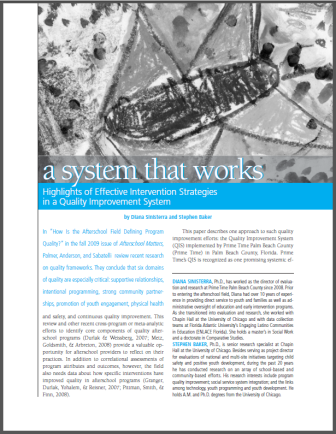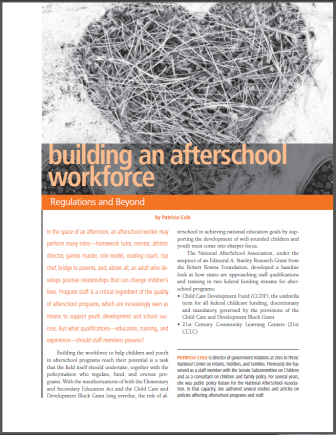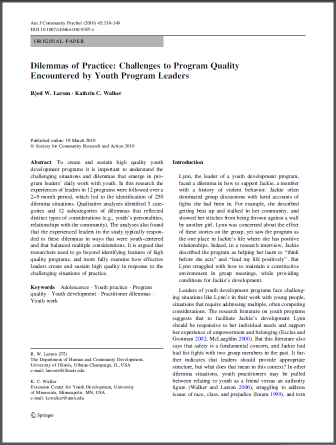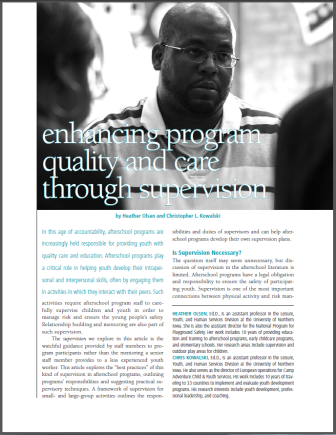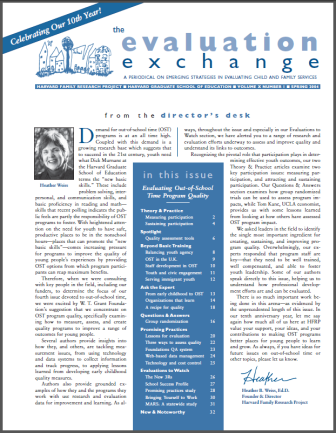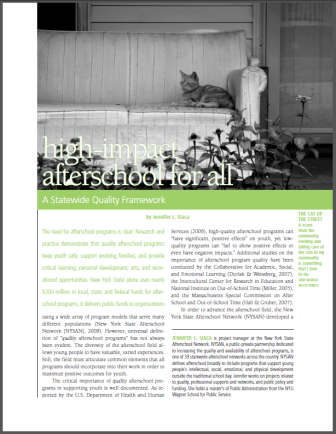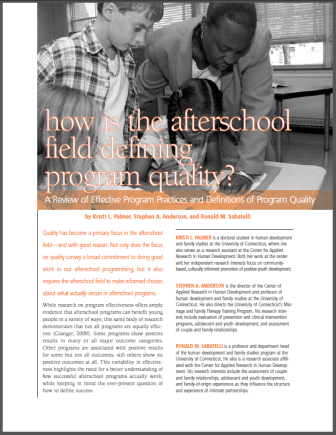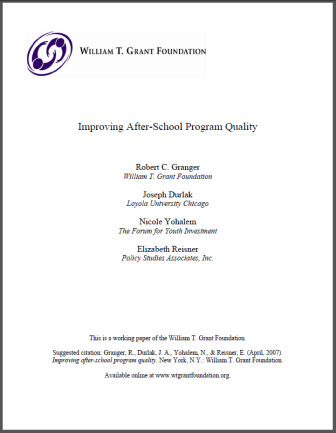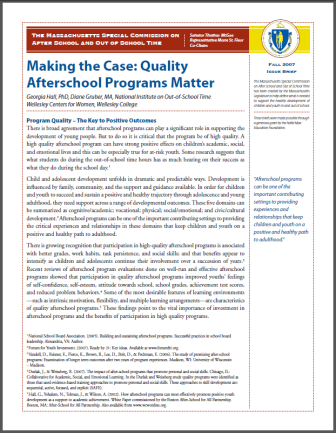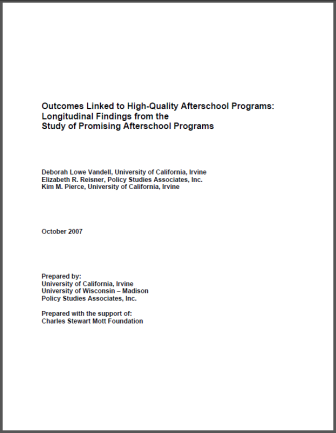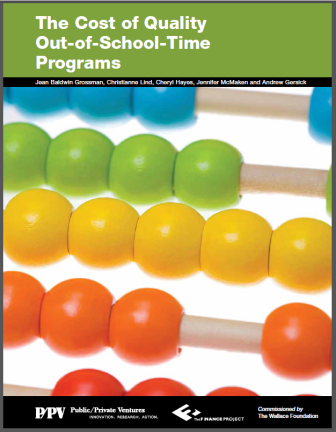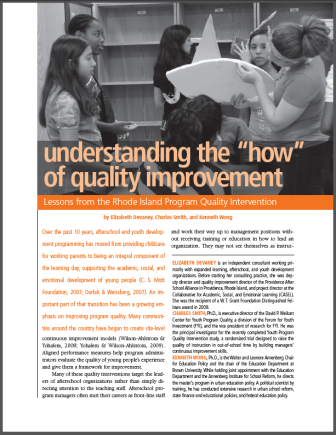
Explore & Download These Resources
Massachusetts Afterschool and Out-of-School Time Quality Indicators Alignment Study Final Report
In Massachusetts, afterschool and out-of-school time programs are overseen by both the Department of Early Education and Care and the
Department of Elementary and Secondary Education. To improve coordination across the existing quality initiatives, the agencies initiated a process to create a common set of quality indicators for all programs. This is the final report by the Education Development Center, Inc. of the alignment study of quality indicators in Massachusetts, which can serve as a model for other states.
Foundations for Young Adult Success
A report by the University of Chicago which aims to build a common understanding of young people’s developmental needs from early childhood through young adulthood and proposes a developmental framework of the Foundations for Young Adult Success. The framework is the result of synthesizing research, theory, and practice knowledge from a range of disciplines and approaches.
A System That Works: Highlights of Effective Intervention Strategies in a Quality Improvement System
An article that describes Palm Beach County’s quality standards tool, which is aligned with consensus in the OST field about key aspects of quality.
» Download the Article (PDF) «
Building an Afterschool Workforce: Regulations and Beyond
Commissioned by the Robert Bowne Foundation, this is a study that developed a baseline for how states are approaching staff qualifications and training in two federal funding streams for afterschool programs: Child Care Development Fund (CCDF) and the 21st Century Community Learning Centers (21st CCLC).
Dilemmas of Practice: Challenges to Program Quality Encountered by Youth Program Leaders
This was a study to understand the challenging situations and dilemmas that emerge in program leaders’ daily work with youth. Qualitative analyses identified 5 categories and 12 subcategories of dilemmas that reflected distinct types of considerations. The analyses also found that the experienced leaders in the study typically responded to these dilemmas in ways that were youth-centered and that balanced multiple considerations.
Enhancing Program Quality and Care Through Supervision
The supervision explored in this article is the watchful guidance provided by staff members to program participants rather than the mentoring a senior staff member provides to a less experienced youth worker. This article explores the “best practices” of this kind of supervision in afterschool programs, outlining programs’ responsibilities and suggesting practical supervisory techniques.
Evaluating Out-of-School Time Program Quality
A newsletter by the Harvard Family Research Project that contains a collection of articles about evaluating various aspects of youth programs, such as retention of youth. In addition, lists the most current evaluation tools to date.
High Impact Afterschool for All: A Statewide Quality Framework
This article describes the development of the New York State Afterschool Network’s journey from developing the first iteration of the NYSAN self-assessment framework through implementing complex strategies to promote quality throughout the state. It suggests ways in which this framework can be useful to afterschool practitioners, technical assistance professionals, intermediaries, and policymakers nationwide
How Is the Afterschool Field Defining Program Quality: A Review of Effective Program Practices and Definitions of Program Quality
A literature review of studies of program effectiveness and how program quality has been conceptualized by afterschool researchers. The article concludes by discussing the field’s emerging consensus regarding quality afterschool programming, highlighting key considerations as the afterschool field undertakes efforts to achieve both program quality and positive outcomes for youth.
Improving After-School Program Quality
This paper summarizes the findings from two recent reports relevant to these policy and practice questions. Durlak and Weissberg and Yohalem and Wilson-Ahlstrom, the aim being to help the field consider the implications of these two reports for policy and practice.
Making the Case: Quality Afterschool Programs Matter
Findings from the Massachusetts Afterschool Research Study (MARS) showed that program quality across the state of Massachusetts is uneven unrelated to geographic location, auspices, or program mission. The report also found recent studies including MARS, shed light on the association between program features and high quality program experiences. From these studies the authros summarize program characteristics and features that cut across all high quality programs .
Outcomes Linked to High-Quality Afterschool Programs: Longitudinal Findings from the Study of Promising Afterschool Programs
A seminal study that found that regular participation in high-quality afterschool programs is linked to significant gains in standardized test scores and work habits as well as reductions in behavior problems among disadvantaged students. These gains help offset the negative impact of a lack of supervision after school.
The Cost of Quality Out-of-School-Time Programs
This report looked at the full costs of quality programs, that is, programs’ cash outlays plus the value of the non-monetary contributions, such as physical space or volunteer time. This report gives planners a keener understanding of the true costs of quality. Equally important, the research uncovers and explains many complexities of OST costs.
Understanding The How of Quality Improvement: Lessons From the Rhode Island Program Quality Intervention
At study of the Rhode Island Program Quality Intervention that found participation in a continuous quality improvement initiative produces higher-quality practice by fostering change in program management practices, and that quality improvement begins with program managers, who lead the process of change.






